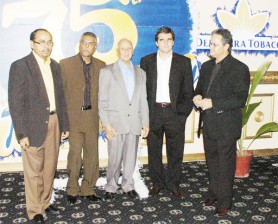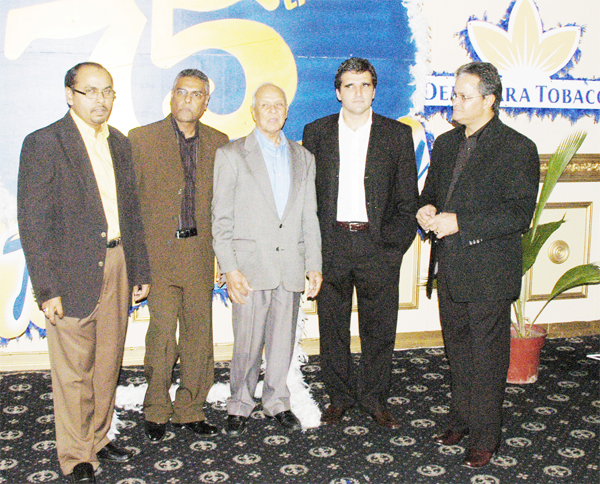The 2008 Annual Report of Demerara Tobacco has trumpeted another year of “solid performance” during which it recorded after tax profits of $928.3m.

In what has been its strongest performance over the past five years, the company, a member of the British-American Tobacco Group, upped its profits by 6.39 per cent over 2007. Net profits before tax reached $1.88 billion compared with $1.77 billion in the previous year. The 2007 after tax profit was $872m.
High taxes on tobacco products continued to ensure significant returns to the public treasury. Last year tobacco taxes totalled $2.7 billion or 45 per of the company’s gross turnover in the form of Excise, Value Added and Corpora-tion taxes, compared with $2.5 billion in total taxes paid in 2007.
According to the submission by Chairman of the Board of Directors, Patrick Smith, shareholders’ earnings per share increased by $2.38 or 6.38 per cent as a result of the increase in net profits. Price increases for the company’s products in July 2008 also helped the company
pay three interim dividends totalling $22.27 per share and a special dividend of $15 per share. Smith said that a final dividend of $15.85 per share has been proposed by the Company’s Board of Directors. The overall return to investors amounted to 21 per cent or $1.2 billion, representing a 55 per cent increase over the previous year.
The company’s strong performance last year is attributed in large measure to the success of its international brands, Dunhill and Pall Mall and to price increases secured in July last year which pushed turnover for 2008 to $301m or 6.59 per cent over 2007. Additionally, the report paid tribute to the contribution made by its distributors, Edward B. Beharry and Company to last year’s success.
And according to the Board Chairman, Demerara Tobacco delivered “exceptional shareholder value” last year despite “increasing pressures against tobacco industry.” He said that while the company is an “active marketer of our brands” it continues to practice the highest levels of responsible marketing having regard to the health issues surrounding tobacco use. He said that the company accepts both the importance of tobacco legislation as well as “balanced and enforceable regulations that focuses on illicit trade and its inherent threat to government revenue.”
In his report Managing Director Chandradat Chintamani said that the company remained concerned with “the challenges of illicit trade, smuggling and counterfeit brands” and will continue to work with the Customs and Trade Administration and the Guyana National Bureau of Standards to respond to what he anticipates will be a growth in such illicit activities in the future. Smith said that the company was also sensitive to the issue of youth smoking and its prevention through stringent penalties for the sale of cigarettes to minors and the importance of “public education on the risk of smoking through appropriate labeling of tobacco products.”
Last year, the company’s operating costs, inclusive of marketing costs, and overheads rose by 10.3 million as a result of “cost factors and other related increases,” accounting for 15 per cent of total gross turnover.

